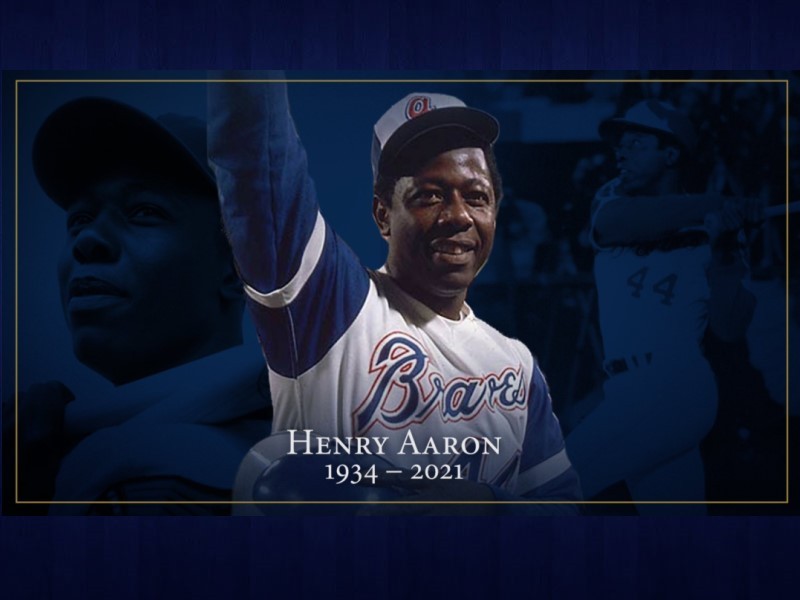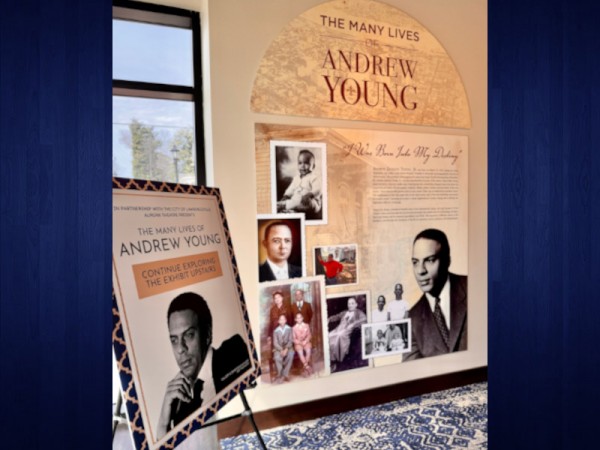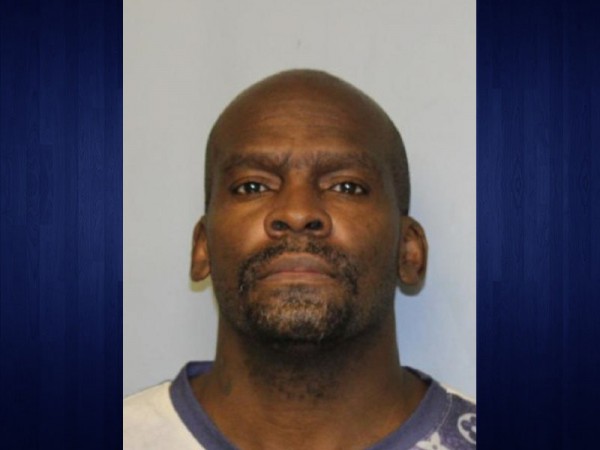ATLANTA (AP) — Hank Aaron, who endured racist threats with stoic dignity during his pursuit of Babe Ruth’s home run record and gracefully left his mark as one of baseball’s greatest all-around players, died Friday. He was 86.
The Atlanta Braves, Aaron's longtime team, said he died peacefully in his sleep. No cause was given.
Aaron made his last public appearance just 2 1/2 weeks ago, when he received the COVID-19 vaccine. He said he wanted to help spread the to Black Americans that the vaccine was safe.
“Hammerin’ Hank” set a wide array of career hitting records during a 23-year career spent mostly with the Milwaukee and Atlanta Braves, including RBIs, extra-base hits and total bases.
But the Hall of Famer will be remembered for one swing above all others, the one that made him baseball’s home-run king.
It was a title he would be hold for more than 33 years, a period in which the Hammer slowly but surely claimed his rightful place as one of America’s most iconic sporting figures, a true national treasure worthy of mention in the same breath with Ruth or Ali or Jordan.
Before a sellout crowd at Atlanta Stadium and a national television audience, Aaron broke Ruth’s home run record with No. 715 off Al Downing of the Los Angeles Dodgers.
The Hall of Famer finished his career with 755, a total surpassed by Barry Bonds in 2007 — though many continued to call the Hammer the true home run king because of allegations that Bonds used performance-enhancing drugs.
Bonds finished his tarnished career with 762, though Aaron never begrudged someone eclipsing his mark.
His common refrain: More than three decades as the king was long enough. It was time for someone else to hold the record.
No one could take away his legacy.
“I just tried to play the game the way it was supposed to be played,” Aaron said, summing it up better than anyone.
He wasn’t on hand when Bonds hit No. 756, but he did tape a congratulatory message that was shown on the video board in San Francisco shortly after the new record-holder went deep. While saddened by claims of rampant steroid use in baseball in the late 1990s and early 2000s, Aaron never challenged those marks set by players who may have taken pharmaceutical short cuts.
Besides, he always had that April night in 1974.
“Downing was more of a finesse pitcher,” Aaron remembered shortly before the 30th anniversary of the landmark homer. “I guess he was trying to throw me a screwball or something. Whatever it was, I got enough of it.”
Aaron’s journey to that memorable homer was hardly pleasant. He was the target of extensive hate mail as he closed in on Ruth’s cherished record of 714, much of it sparked by the fact Ruth was white and Aaron was black.
“If I was white, all America would be proud of me,” Aaron said almost a year before he passed Ruth. “But I am black.”
Aaron was shadowed constantly by bodyguards and forced to distance himself from teammates. He kept all those hateful letters, a bitter reminder of the abuse he endured and never forgot.
“It’s very offensive,” he once said. “They call me ‘nigger’ and every other bad word you can come up with. You can’t ignore them. They are here. But this is just the way things are for black people in America. It’s something you battle all of your life.”
After retiring in 1976, Aaron became a revered, almost mythical figure, even though he never pursued the spotlight. He was thrilled when the U.S. elected its first African-American president, Barack Obama, in 2008. Former President Bill Clinton credited Aaron with helping carve a path of racial tolerance that made Obama’s victory possible.
“We’re a different country now,” Clinton said at a 75th birthday celebration for Aaron. “You’ve given us far more than we’ll ever give you.”
Aaron spent 21 of his 23 seasons with the Braves, first in Milwaukee, then in Atlanta after the franchise moved to the Deep South in 1966. He finished his career back in Milwaukee, traded to the Brewers after the 1974 season when he refused to take a front-office job that would have required a big pay cut.
While knocking the ball over the fence became his signature accomplishment, the Hammer was hardly a one-dimensional star. In fact, he never hit more than 47 homers in a season (though he did have eight years with at least 40 dingers).
But it can be argued that no one was so good, for so long, at so many facets of the national pastime.
The long ball was only part of his arsenal.
Aaron was a true five-tool star.
He posted 14 seasons with a .300 average — the last of them at age 39 — and claimed two National League batting titles. He finished with a career average of .305.
Aaron also was a gifted outfielder with a powerful arm, something often overlooked because of a smooth, effortless stride that his critics — with undoubtedly racist overtones — mistook for nonchalance. He was a three-time Gold Glove winner.
Then there was his work on the base paths. Aaron posted seven seasons with more than 20 stolen bases, including a career-best of 31 in 1963 when became only the third member of the 30-30 club — players who have totaled at least 30 homers and 30 steals in a season.
To that point, the feat had only been accomplished by Ken Williams (1922) and Willie Mays (1956 and ’57).
___
Follow Paul Newberry on Twitter at https://twitter.com/pnewberry1963 His work can be found at https://apnews.com/search/paulnewberry___
___
More AP MLB: https://apnews.com/MLB and https://twitter.com/AP_Sports

















